UKCBC Report: Legislation and Ethics in the Travel and Tourism Sector
VerifiedAdded on 2024/05/27
|26
|5083
|231
Report
AI Summary
This report provides an overview of the legal and ethical considerations within the travel and tourism industry, focusing on the UK regulatory framework. It covers key legislation such as the Development of Tourism Act, Package Travel Regulations, and Transport Acts, along with the roles of bodies like ABTA, HSC, HSE, CAA, and IATA. The report discusses air, sea, and surface transport laws, including the Warsaw and Athens Conventions, and examines the influence of health, safety, and security principles, referencing the Health and Safety at Work Act and Occupiers Liability Act. Furthermore, it analyzes equality legislation like the Employment Protection Act, Human Rights Act, and Sex Discrimination Act in the context of Virgin Holidays. The report also addresses ethical dilemmas in the tourism sector and analyzes the CSR policy of TUI Group.

LEGISLATION AND ETHICS IN TRAVEL AND TOURISM
Paraphrase This Document
Need a fresh take? Get an instant paraphrase of this document with our AI Paraphraser
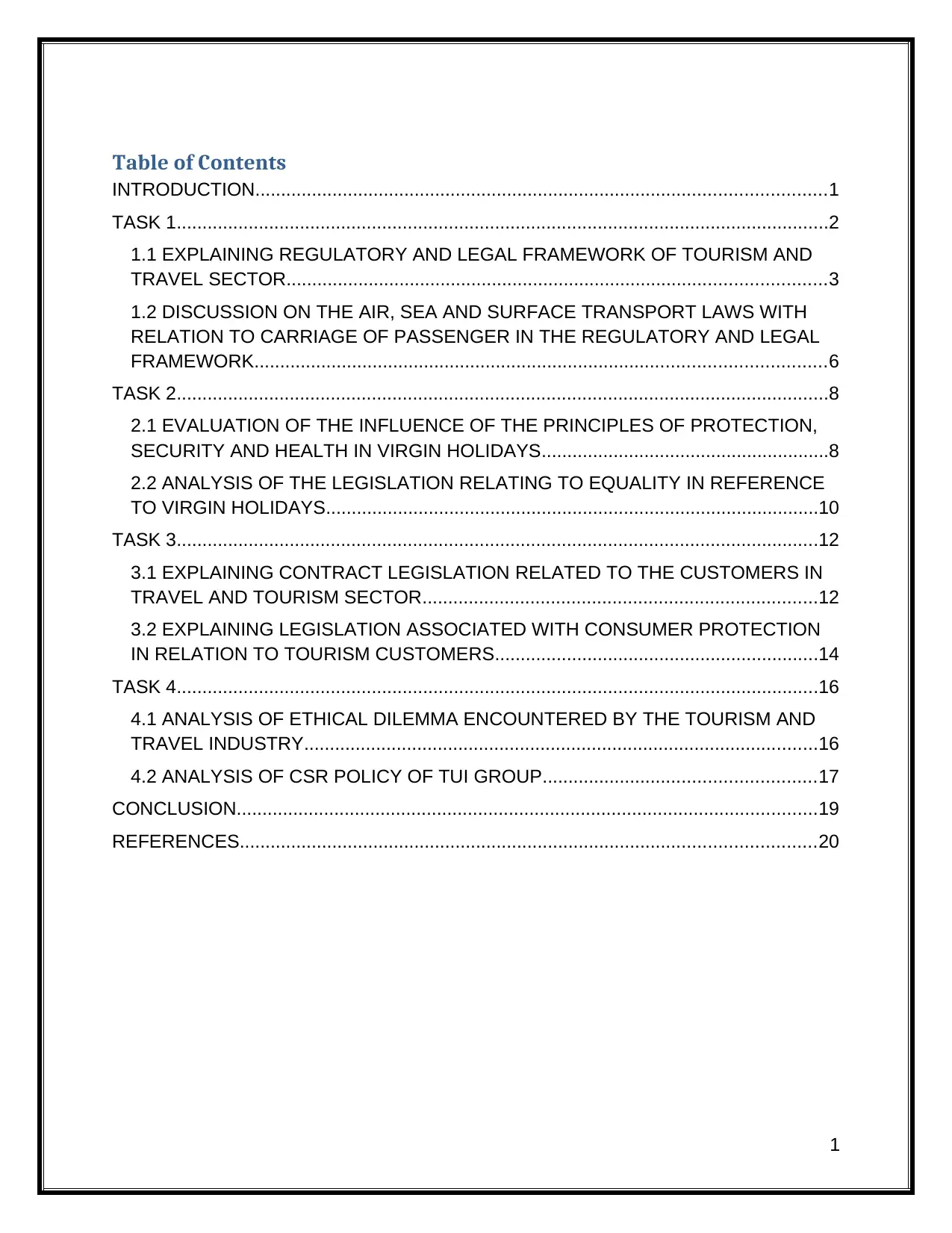
Table of Contents
INTRODUCTION...............................................................................................................1
TASK 1...............................................................................................................................2
1.1 EXPLAINING REGULATORY AND LEGAL FRAMEWORK OF TOURISM AND
TRAVEL SECTOR.........................................................................................................3
1.2 DISCUSSION ON THE AIR, SEA AND SURFACE TRANSPORT LAWS WITH
RELATION TO CARRIAGE OF PASSENGER IN THE REGULATORY AND LEGAL
FRAMEWORK...............................................................................................................6
TASK 2...............................................................................................................................8
2.1 EVALUATION OF THE INFLUENCE OF THE PRINCIPLES OF PROTECTION,
SECURITY AND HEALTH IN VIRGIN HOLIDAYS........................................................8
2.2 ANALYSIS OF THE LEGISLATION RELATING TO EQUALITY IN REFERENCE
TO VIRGIN HOLIDAYS................................................................................................10
TASK 3.............................................................................................................................12
3.1 EXPLAINING CONTRACT LEGISLATION RELATED TO THE CUSTOMERS IN
TRAVEL AND TOURISM SECTOR.............................................................................12
3.2 EXPLAINING LEGISLATION ASSOCIATED WITH CONSUMER PROTECTION
IN RELATION TO TOURISM CUSTOMERS...............................................................14
TASK 4.............................................................................................................................16
4.1 ANALYSIS OF ETHICAL DILEMMA ENCOUNTERED BY THE TOURISM AND
TRAVEL INDUSTRY....................................................................................................16
4.2 ANALYSIS OF CSR POLICY OF TUI GROUP.....................................................17
CONCLUSION.................................................................................................................19
REFERENCES................................................................................................................20
1
INTRODUCTION...............................................................................................................1
TASK 1...............................................................................................................................2
1.1 EXPLAINING REGULATORY AND LEGAL FRAMEWORK OF TOURISM AND
TRAVEL SECTOR.........................................................................................................3
1.2 DISCUSSION ON THE AIR, SEA AND SURFACE TRANSPORT LAWS WITH
RELATION TO CARRIAGE OF PASSENGER IN THE REGULATORY AND LEGAL
FRAMEWORK...............................................................................................................6
TASK 2...............................................................................................................................8
2.1 EVALUATION OF THE INFLUENCE OF THE PRINCIPLES OF PROTECTION,
SECURITY AND HEALTH IN VIRGIN HOLIDAYS........................................................8
2.2 ANALYSIS OF THE LEGISLATION RELATING TO EQUALITY IN REFERENCE
TO VIRGIN HOLIDAYS................................................................................................10
TASK 3.............................................................................................................................12
3.1 EXPLAINING CONTRACT LEGISLATION RELATED TO THE CUSTOMERS IN
TRAVEL AND TOURISM SECTOR.............................................................................12
3.2 EXPLAINING LEGISLATION ASSOCIATED WITH CONSUMER PROTECTION
IN RELATION TO TOURISM CUSTOMERS...............................................................14
TASK 4.............................................................................................................................16
4.1 ANALYSIS OF ETHICAL DILEMMA ENCOUNTERED BY THE TOURISM AND
TRAVEL INDUSTRY....................................................................................................16
4.2 ANALYSIS OF CSR POLICY OF TUI GROUP.....................................................17
CONCLUSION.................................................................................................................19
REFERENCES................................................................................................................20
1
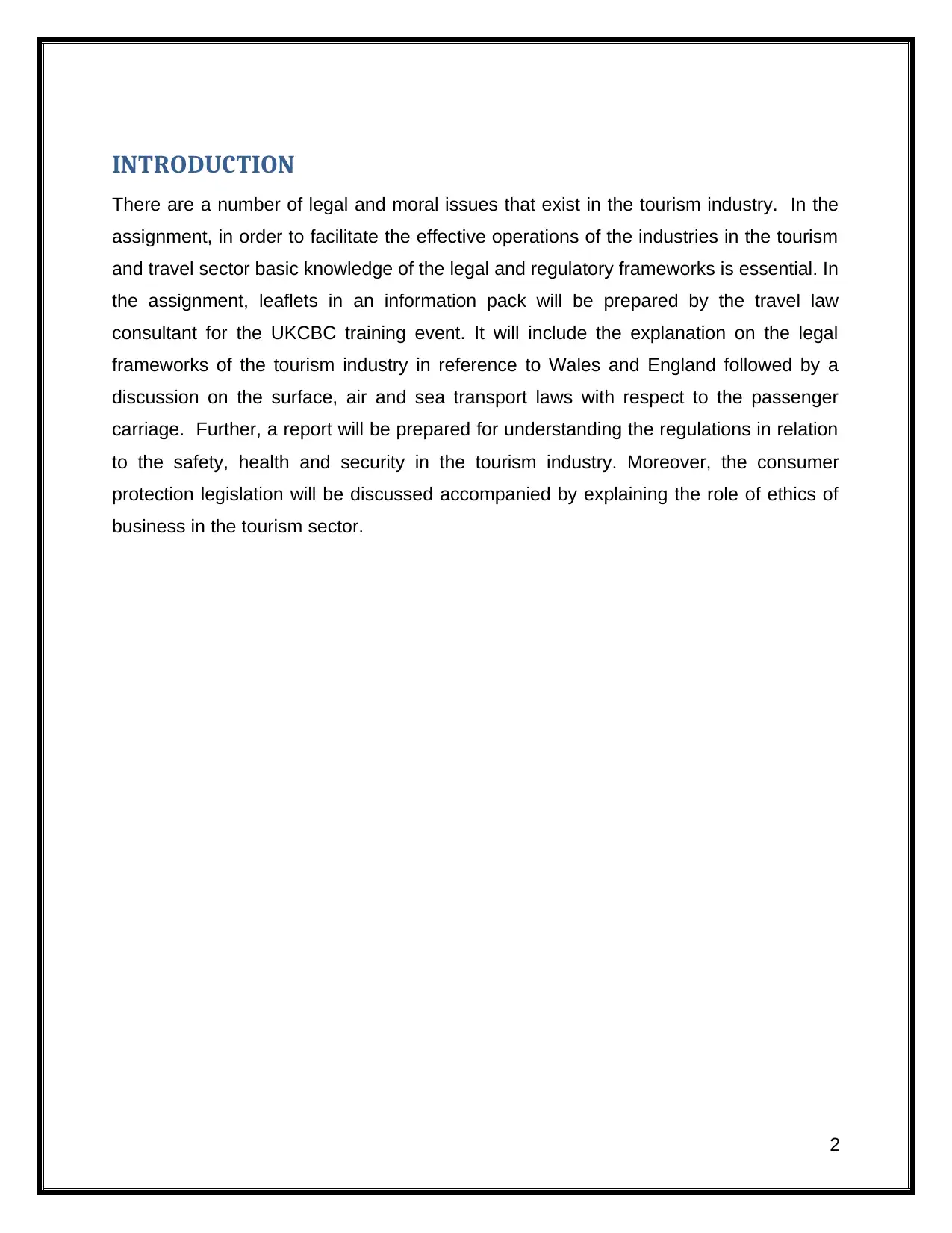
INTRODUCTION
There are a number of legal and moral issues that exist in the tourism industry. In the
assignment, in order to facilitate the effective operations of the industries in the tourism
and travel sector basic knowledge of the legal and regulatory frameworks is essential. In
the assignment, leaflets in an information pack will be prepared by the travel law
consultant for the UKCBC training event. It will include the explanation on the legal
frameworks of the tourism industry in reference to Wales and England followed by a
discussion on the surface, air and sea transport laws with respect to the passenger
carriage. Further, a report will be prepared for understanding the regulations in relation
to the safety, health and security in the tourism industry. Moreover, the consumer
protection legislation will be discussed accompanied by explaining the role of ethics of
business in the tourism sector.
2
There are a number of legal and moral issues that exist in the tourism industry. In the
assignment, in order to facilitate the effective operations of the industries in the tourism
and travel sector basic knowledge of the legal and regulatory frameworks is essential. In
the assignment, leaflets in an information pack will be prepared by the travel law
consultant for the UKCBC training event. It will include the explanation on the legal
frameworks of the tourism industry in reference to Wales and England followed by a
discussion on the surface, air and sea transport laws with respect to the passenger
carriage. Further, a report will be prepared for understanding the regulations in relation
to the safety, health and security in the tourism industry. Moreover, the consumer
protection legislation will be discussed accompanied by explaining the role of ethics of
business in the tourism sector.
2
⊘ This is a preview!⊘
Do you want full access?
Subscribe today to unlock all pages.

Trusted by 1+ million students worldwide
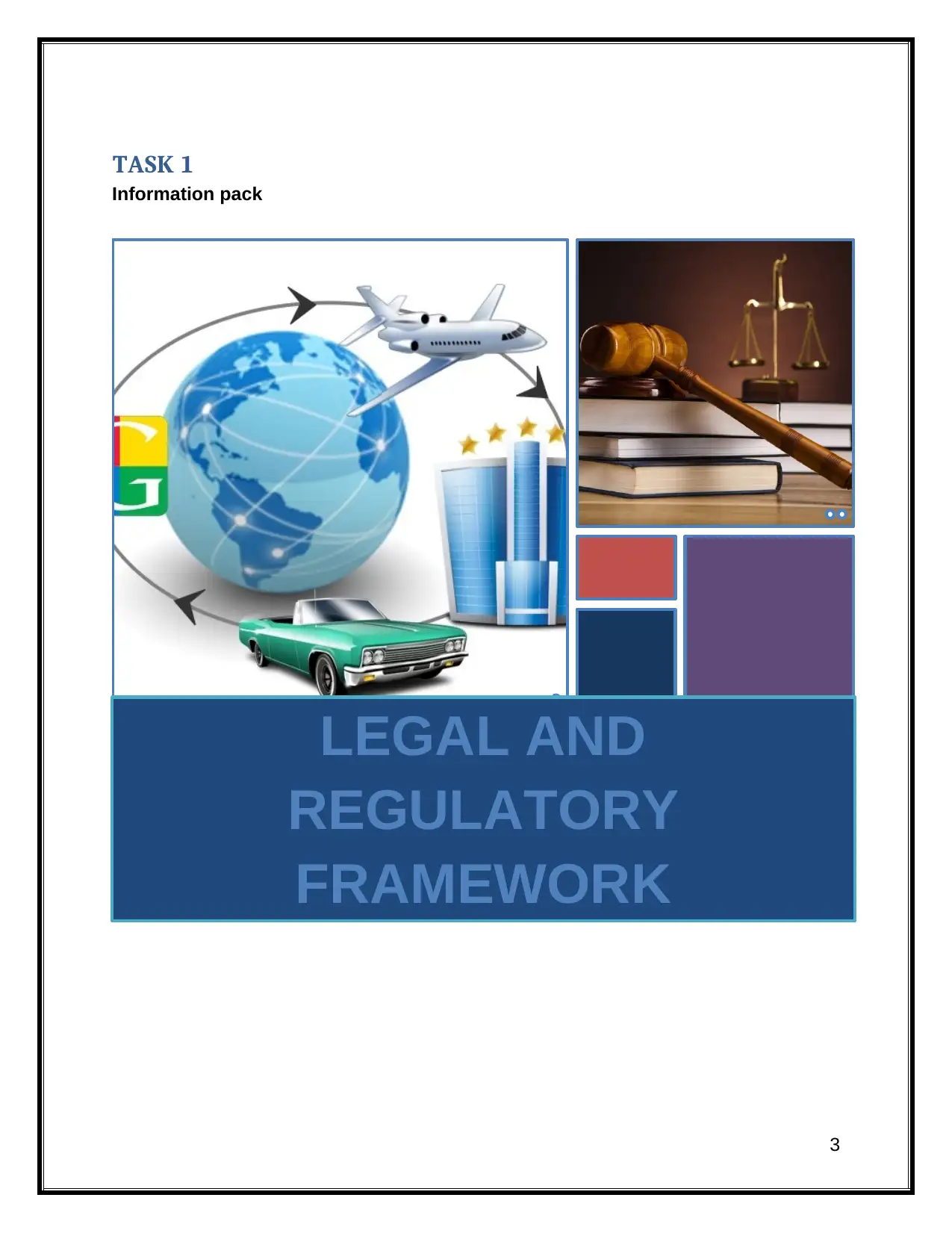
TASK 1
Information pack
3
LEGAL AND
REGULATORY
FRAMEWORK
Information pack
3
LEGAL AND
REGULATORY
FRAMEWORK
Paraphrase This Document
Need a fresh take? Get an instant paraphrase of this document with our AI Paraphraser
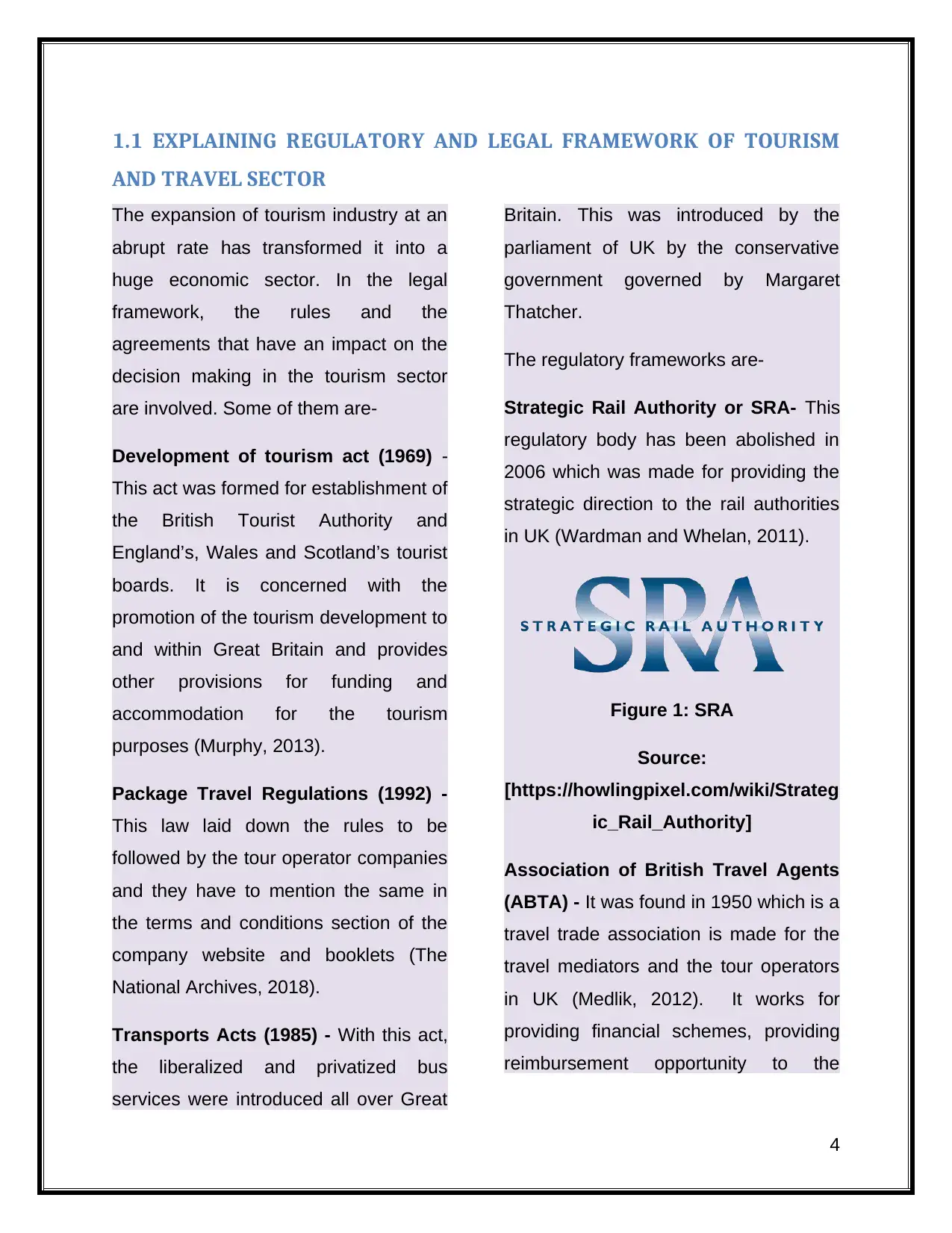
1.1 EXPLAINING REGULATORY AND LEGAL FRAMEWORK OF TOURISM
AND TRAVEL SECTOR
The expansion of tourism industry at an
abrupt rate has transformed it into a
huge economic sector. In the legal
framework, the rules and the
agreements that have an impact on the
decision making in the tourism sector
are involved. Some of them are-
Development of tourism act (1969) -
This act was formed for establishment of
the British Tourist Authority and
England’s, Wales and Scotland’s tourist
boards. It is concerned with the
promotion of the tourism development to
and within Great Britain and provides
other provisions for funding and
accommodation for the tourism
purposes (Murphy, 2013).
Package Travel Regulations (1992) -
This law laid down the rules to be
followed by the tour operator companies
and they have to mention the same in
the terms and conditions section of the
company website and booklets (The
National Archives, 2018).
Transports Acts (1985) - With this act,
the liberalized and privatized bus
services were introduced all over Great
Britain. This was introduced by the
parliament of UK by the conservative
government governed by Margaret
Thatcher.
The regulatory frameworks are-
Strategic Rail Authority or SRA- This
regulatory body has been abolished in
2006 which was made for providing the
strategic direction to the rail authorities
in UK (Wardman and Whelan, 2011).
Figure 1: SRA
Source:
[https://howlingpixel.com/wiki/Strateg
ic_Rail_Authority]
Association of British Travel Agents
(ABTA) - It was found in 1950 which is a
travel trade association is made for the
travel mediators and the tour operators
in UK (Medlik, 2012). It works for
providing financial schemes, providing
reimbursement opportunity to the
4
AND TRAVEL SECTOR
The expansion of tourism industry at an
abrupt rate has transformed it into a
huge economic sector. In the legal
framework, the rules and the
agreements that have an impact on the
decision making in the tourism sector
are involved. Some of them are-
Development of tourism act (1969) -
This act was formed for establishment of
the British Tourist Authority and
England’s, Wales and Scotland’s tourist
boards. It is concerned with the
promotion of the tourism development to
and within Great Britain and provides
other provisions for funding and
accommodation for the tourism
purposes (Murphy, 2013).
Package Travel Regulations (1992) -
This law laid down the rules to be
followed by the tour operator companies
and they have to mention the same in
the terms and conditions section of the
company website and booklets (The
National Archives, 2018).
Transports Acts (1985) - With this act,
the liberalized and privatized bus
services were introduced all over Great
Britain. This was introduced by the
parliament of UK by the conservative
government governed by Margaret
Thatcher.
The regulatory frameworks are-
Strategic Rail Authority or SRA- This
regulatory body has been abolished in
2006 which was made for providing the
strategic direction to the rail authorities
in UK (Wardman and Whelan, 2011).
Figure 1: SRA
Source:
[https://howlingpixel.com/wiki/Strateg
ic_Rail_Authority]
Association of British Travel Agents
(ABTA) - It was found in 1950 which is a
travel trade association is made for the
travel mediators and the tour operators
in UK (Medlik, 2012). It works for
providing financial schemes, providing
reimbursement opportunity to the
4
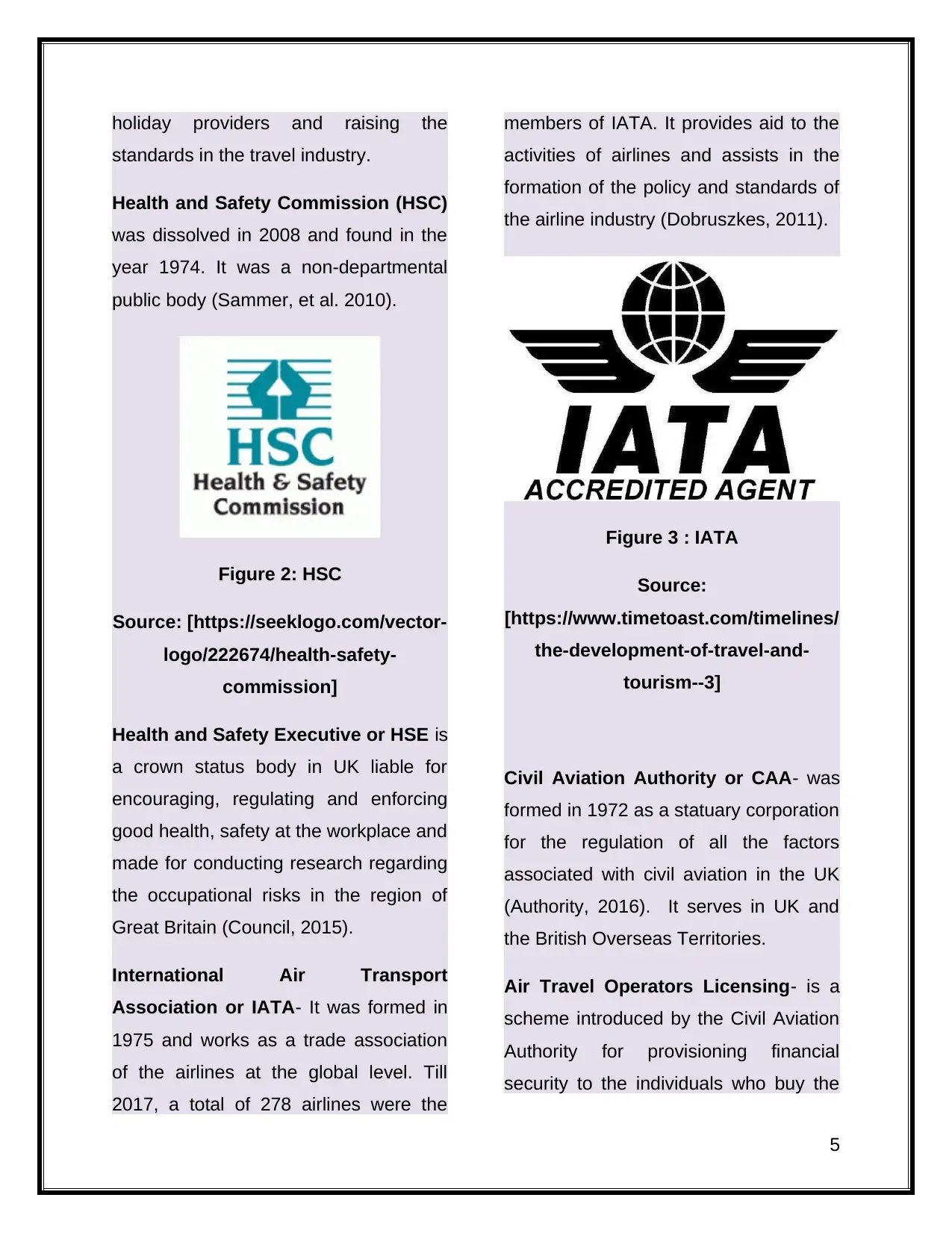
holiday providers and raising the
standards in the travel industry.
Health and Safety Commission (HSC)
was dissolved in 2008 and found in the
year 1974. It was a non-departmental
public body (Sammer, et al. 2010).
Figure 2: HSC
Source: [https://seeklogo.com/vector-
logo/222674/health-safety-
commission]
Health and Safety Executive or HSE is
a crown status body in UK liable for
encouraging, regulating and enforcing
good health, safety at the workplace and
made for conducting research regarding
the occupational risks in the region of
Great Britain (Council, 2015).
International Air Transport
Association or IATA- It was formed in
1975 and works as a trade association
of the airlines at the global level. Till
2017, a total of 278 airlines were the
members of IATA. It provides aid to the
activities of airlines and assists in the
formation of the policy and standards of
the airline industry (Dobruszkes, 2011).
Figure 3 : IATA
Source:
[https://www.timetoast.com/timelines/
the-development-of-travel-and-
tourism--3]
Civil Aviation Authority or CAA- was
formed in 1972 as a statuary corporation
for the regulation of all the factors
associated with civil aviation in the UK
(Authority, 2016). It serves in UK and
the British Overseas Territories.
Air Travel Operators Licensing- is a
scheme introduced by the Civil Aviation
Authority for provisioning financial
security to the individuals who buy the
5
standards in the travel industry.
Health and Safety Commission (HSC)
was dissolved in 2008 and found in the
year 1974. It was a non-departmental
public body (Sammer, et al. 2010).
Figure 2: HSC
Source: [https://seeklogo.com/vector-
logo/222674/health-safety-
commission]
Health and Safety Executive or HSE is
a crown status body in UK liable for
encouraging, regulating and enforcing
good health, safety at the workplace and
made for conducting research regarding
the occupational risks in the region of
Great Britain (Council, 2015).
International Air Transport
Association or IATA- It was formed in
1975 and works as a trade association
of the airlines at the global level. Till
2017, a total of 278 airlines were the
members of IATA. It provides aid to the
activities of airlines and assists in the
formation of the policy and standards of
the airline industry (Dobruszkes, 2011).
Figure 3 : IATA
Source:
[https://www.timetoast.com/timelines/
the-development-of-travel-and-
tourism--3]
Civil Aviation Authority or CAA- was
formed in 1972 as a statuary corporation
for the regulation of all the factors
associated with civil aviation in the UK
(Authority, 2016). It serves in UK and
the British Overseas Territories.
Air Travel Operators Licensing- is a
scheme introduced by the Civil Aviation
Authority for provisioning financial
security to the individuals who buy the
5
⊘ This is a preview!⊘
Do you want full access?
Subscribe today to unlock all pages.

Trusted by 1+ million students worldwide
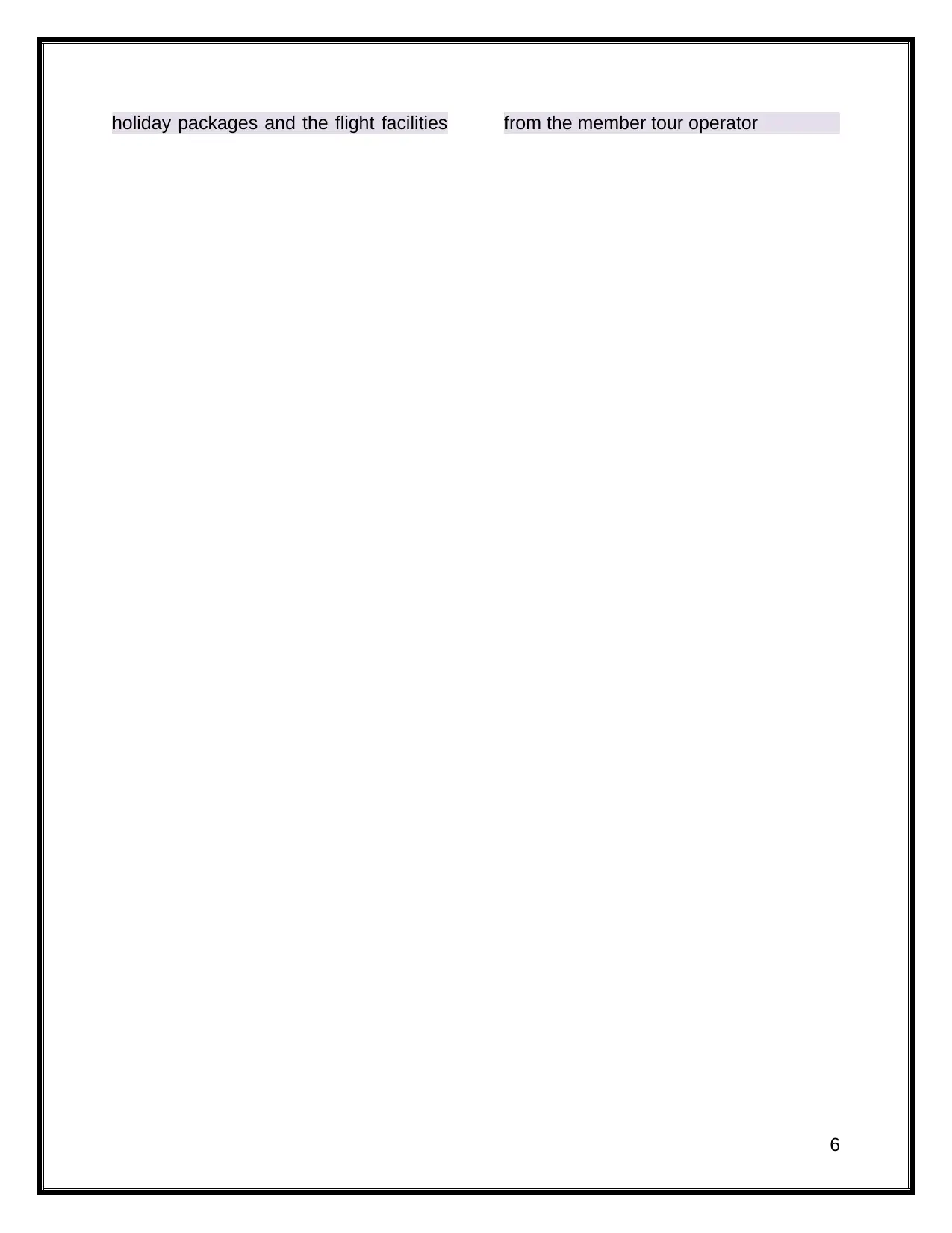
holiday packages and the flight facilities from the member tour operator
6
6
Paraphrase This Document
Need a fresh take? Get an instant paraphrase of this document with our AI Paraphraser
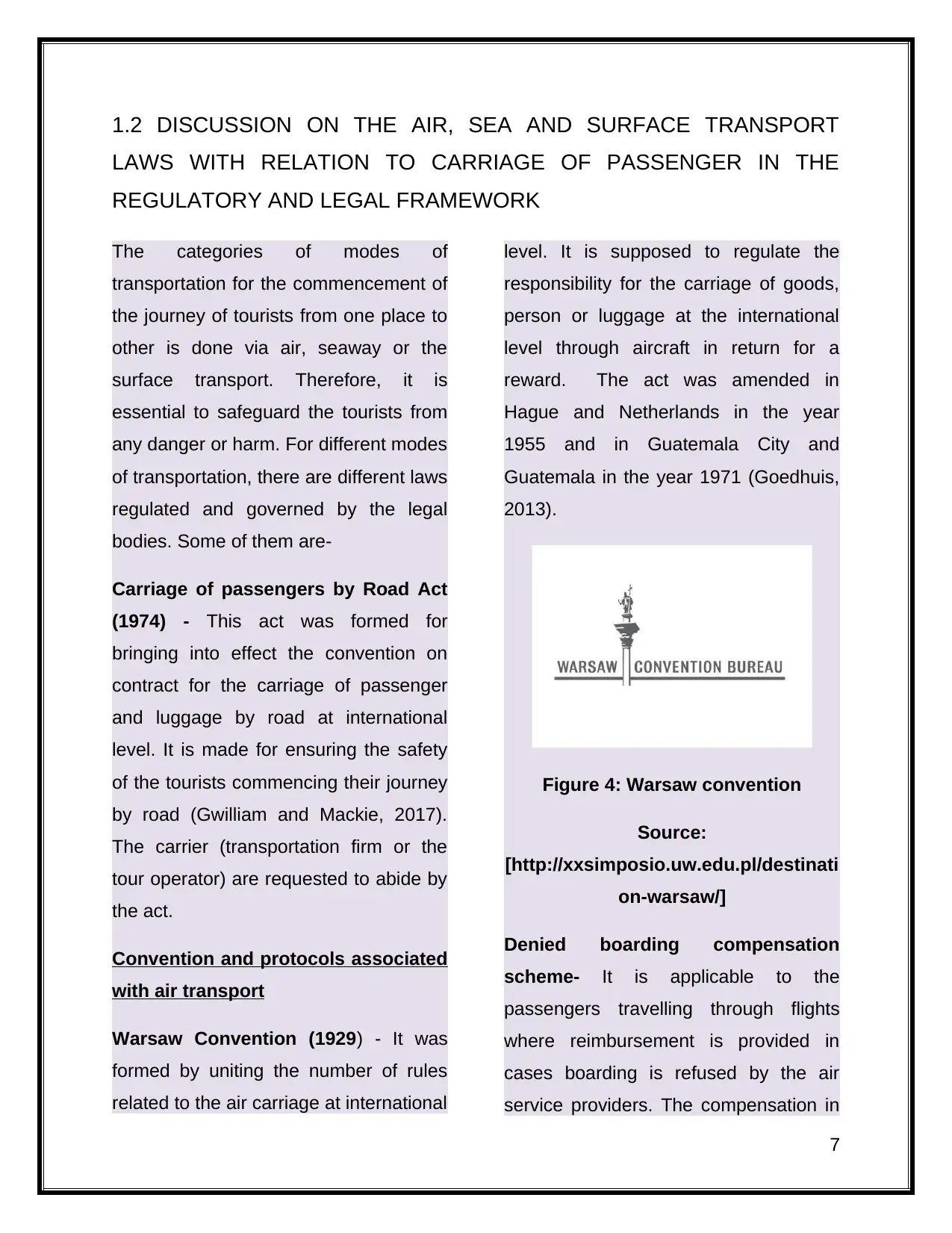
1.2 DISCUSSION ON THE AIR, SEA AND SURFACE TRANSPORT
LAWS WITH RELATION TO CARRIAGE OF PASSENGER IN THE
REGULATORY AND LEGAL FRAMEWORK
The categories of modes of
transportation for the commencement of
the journey of tourists from one place to
other is done via air, seaway or the
surface transport. Therefore, it is
essential to safeguard the tourists from
any danger or harm. For different modes
of transportation, there are different laws
regulated and governed by the legal
bodies. Some of them are-
Carriage of passengers by Road Act
(1974) - This act was formed for
bringing into effect the convention on
contract for the carriage of passenger
and luggage by road at international
level. It is made for ensuring the safety
of the tourists commencing their journey
by road (Gwilliam and Mackie, 2017).
The carrier (transportation firm or the
tour operator) are requested to abide by
the act.
Convention and protocols associated
with air transport
Warsaw Convention (1929) - It was
formed by uniting the number of rules
related to the air carriage at international
level. It is supposed to regulate the
responsibility for the carriage of goods,
person or luggage at the international
level through aircraft in return for a
reward. The act was amended in
Hague and Netherlands in the year
1955 and in Guatemala City and
Guatemala in the year 1971 (Goedhuis,
2013).
Figure 4: Warsaw convention
Source:
[http://xxsimposio.uw.edu.pl/destinati
on-warsaw/]
Denied boarding compensation
scheme- It is applicable to the
passengers travelling through flights
where reimbursement is provided in
cases boarding is refused by the air
service providers. The compensation in
7
LAWS WITH RELATION TO CARRIAGE OF PASSENGER IN THE
REGULATORY AND LEGAL FRAMEWORK
The categories of modes of
transportation for the commencement of
the journey of tourists from one place to
other is done via air, seaway or the
surface transport. Therefore, it is
essential to safeguard the tourists from
any danger or harm. For different modes
of transportation, there are different laws
regulated and governed by the legal
bodies. Some of them are-
Carriage of passengers by Road Act
(1974) - This act was formed for
bringing into effect the convention on
contract for the carriage of passenger
and luggage by road at international
level. It is made for ensuring the safety
of the tourists commencing their journey
by road (Gwilliam and Mackie, 2017).
The carrier (transportation firm or the
tour operator) are requested to abide by
the act.
Convention and protocols associated
with air transport
Warsaw Convention (1929) - It was
formed by uniting the number of rules
related to the air carriage at international
level. It is supposed to regulate the
responsibility for the carriage of goods,
person or luggage at the international
level through aircraft in return for a
reward. The act was amended in
Hague and Netherlands in the year
1955 and in Guatemala City and
Guatemala in the year 1971 (Goedhuis,
2013).
Figure 4: Warsaw convention
Source:
[http://xxsimposio.uw.edu.pl/destinati
on-warsaw/]
Denied boarding compensation
scheme- It is applicable to the
passengers travelling through flights
where reimbursement is provided in
cases boarding is refused by the air
service providers. The compensation in
7
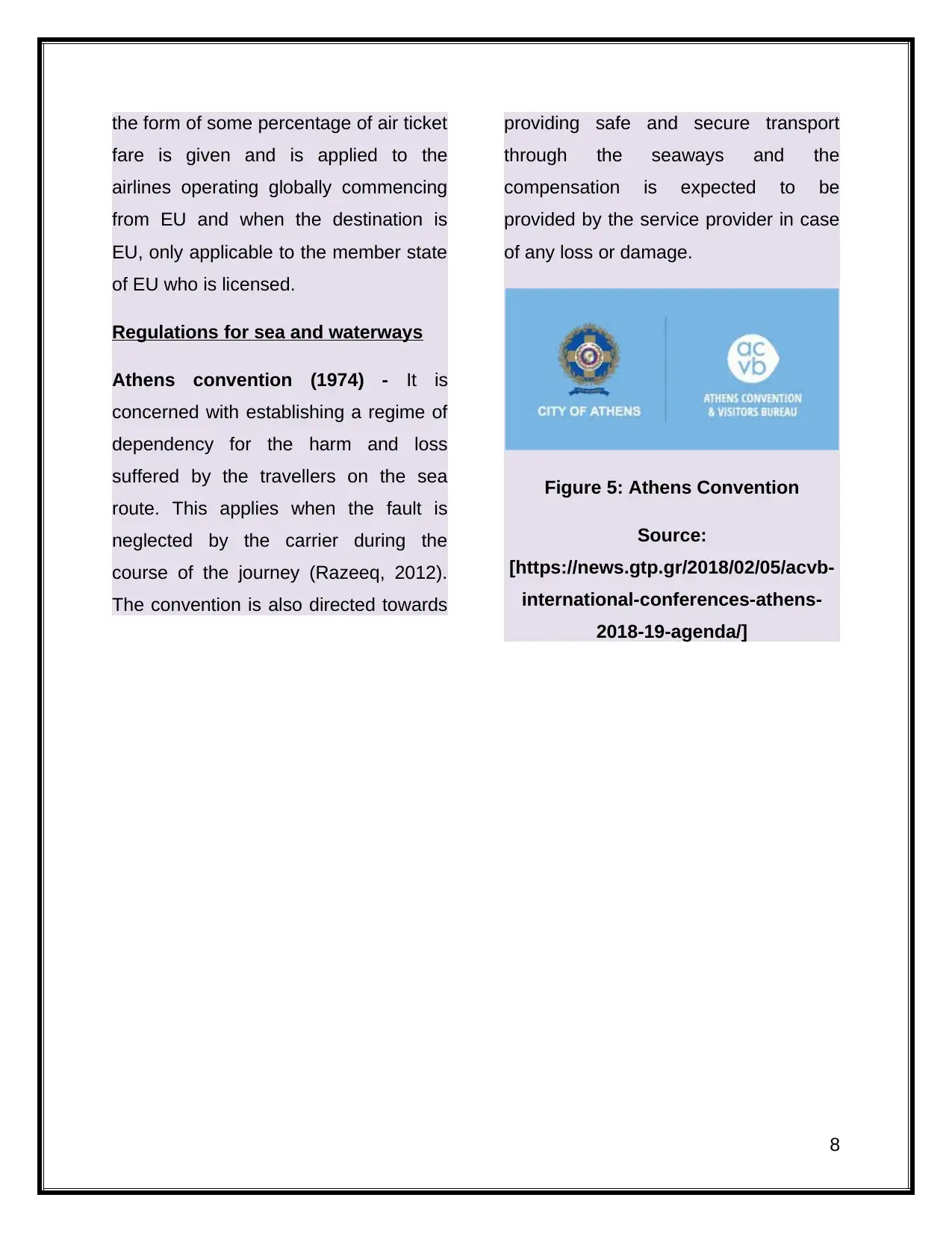
the form of some percentage of air ticket
fare is given and is applied to the
airlines operating globally commencing
from EU and when the destination is
EU, only applicable to the member state
of EU who is licensed.
Regulations for sea and waterways
Athens convention (1974) - It is
concerned with establishing a regime of
dependency for the harm and loss
suffered by the travellers on the sea
route. This applies when the fault is
neglected by the carrier during the
course of the journey (Razeeq, 2012).
The convention is also directed towards
providing safe and secure transport
through the seaways and the
compensation is expected to be
provided by the service provider in case
of any loss or damage.
Figure 5: Athens Convention
Source:
[https://news.gtp.gr/2018/02/05/acvb-
international-conferences-athens-
2018-19-agenda/]
8
fare is given and is applied to the
airlines operating globally commencing
from EU and when the destination is
EU, only applicable to the member state
of EU who is licensed.
Regulations for sea and waterways
Athens convention (1974) - It is
concerned with establishing a regime of
dependency for the harm and loss
suffered by the travellers on the sea
route. This applies when the fault is
neglected by the carrier during the
course of the journey (Razeeq, 2012).
The convention is also directed towards
providing safe and secure transport
through the seaways and the
compensation is expected to be
provided by the service provider in case
of any loss or damage.
Figure 5: Athens Convention
Source:
[https://news.gtp.gr/2018/02/05/acvb-
international-conferences-athens-
2018-19-agenda/]
8
⊘ This is a preview!⊘
Do you want full access?
Subscribe today to unlock all pages.

Trusted by 1+ million students worldwide
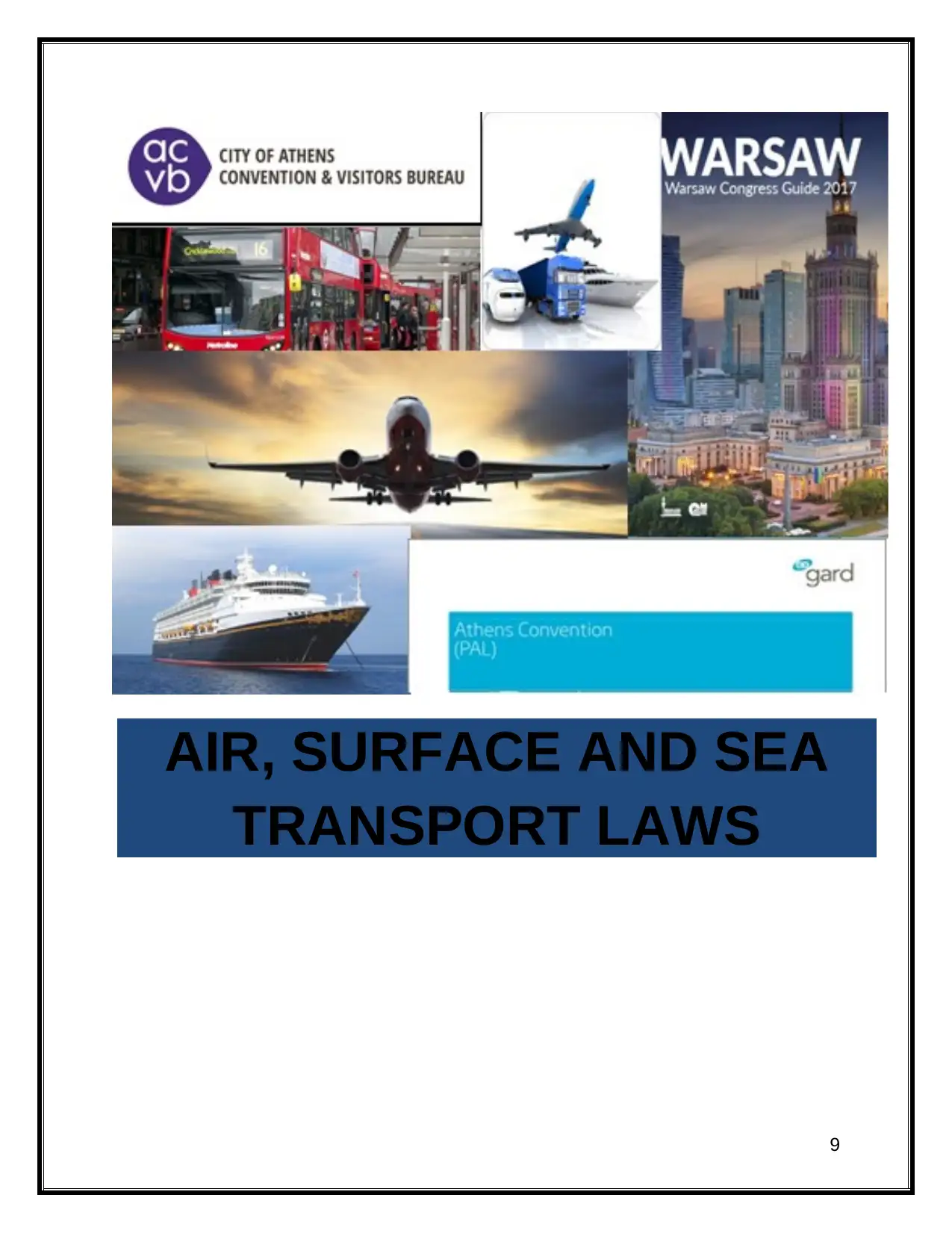
9
AIR, SURFACE AND SEA
TRANSPORT LAWS
AIR, SURFACE AND SEA
TRANSPORT LAWS
Paraphrase This Document
Need a fresh take? Get an instant paraphrase of this document with our AI Paraphraser
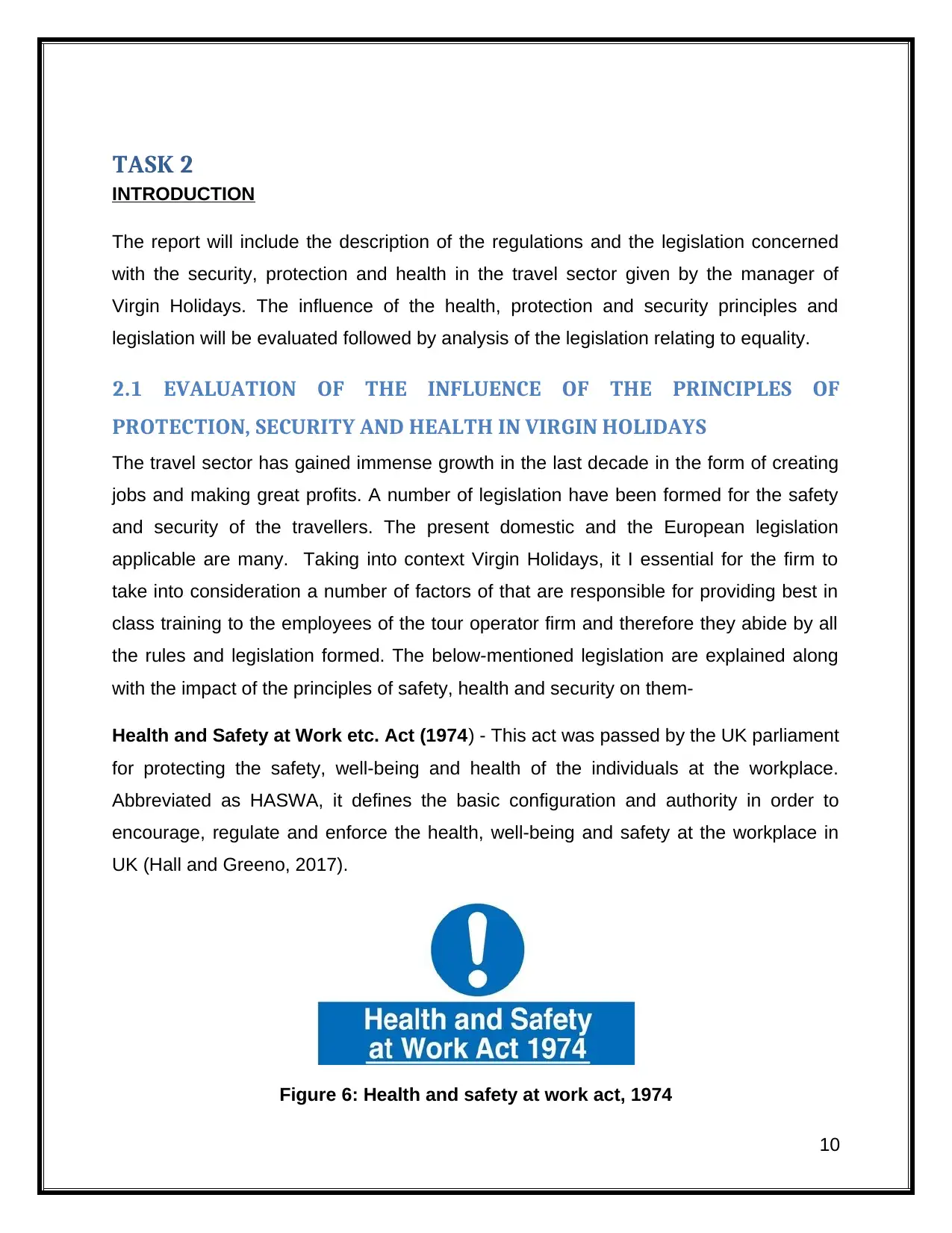
TASK 2
INTRODUCTION
The report will include the description of the regulations and the legislation concerned
with the security, protection and health in the travel sector given by the manager of
Virgin Holidays. The influence of the health, protection and security principles and
legislation will be evaluated followed by analysis of the legislation relating to equality.
2.1 EVALUATION OF THE INFLUENCE OF THE PRINCIPLES OF
PROTECTION, SECURITY AND HEALTH IN VIRGIN HOLIDAYS
The travel sector has gained immense growth in the last decade in the form of creating
jobs and making great profits. A number of legislation have been formed for the safety
and security of the travellers. The present domestic and the European legislation
applicable are many. Taking into context Virgin Holidays, it I essential for the firm to
take into consideration a number of factors of that are responsible for providing best in
class training to the employees of the tour operator firm and therefore they abide by all
the rules and legislation formed. The below-mentioned legislation are explained along
with the impact of the principles of safety, health and security on them-
Health and Safety at Work etc. Act (1974) - This act was passed by the UK parliament
for protecting the safety, well-being and health of the individuals at the workplace.
Abbreviated as HASWA, it defines the basic configuration and authority in order to
encourage, regulate and enforce the health, well-being and safety at the workplace in
UK (Hall and Greeno, 2017).
Figure 6: Health and safety at work act, 1974
10
INTRODUCTION
The report will include the description of the regulations and the legislation concerned
with the security, protection and health in the travel sector given by the manager of
Virgin Holidays. The influence of the health, protection and security principles and
legislation will be evaluated followed by analysis of the legislation relating to equality.
2.1 EVALUATION OF THE INFLUENCE OF THE PRINCIPLES OF
PROTECTION, SECURITY AND HEALTH IN VIRGIN HOLIDAYS
The travel sector has gained immense growth in the last decade in the form of creating
jobs and making great profits. A number of legislation have been formed for the safety
and security of the travellers. The present domestic and the European legislation
applicable are many. Taking into context Virgin Holidays, it I essential for the firm to
take into consideration a number of factors of that are responsible for providing best in
class training to the employees of the tour operator firm and therefore they abide by all
the rules and legislation formed. The below-mentioned legislation are explained along
with the impact of the principles of safety, health and security on them-
Health and Safety at Work etc. Act (1974) - This act was passed by the UK parliament
for protecting the safety, well-being and health of the individuals at the workplace.
Abbreviated as HASWA, it defines the basic configuration and authority in order to
encourage, regulate and enforce the health, well-being and safety at the workplace in
UK (Hall and Greeno, 2017).
Figure 6: Health and safety at work act, 1974
10
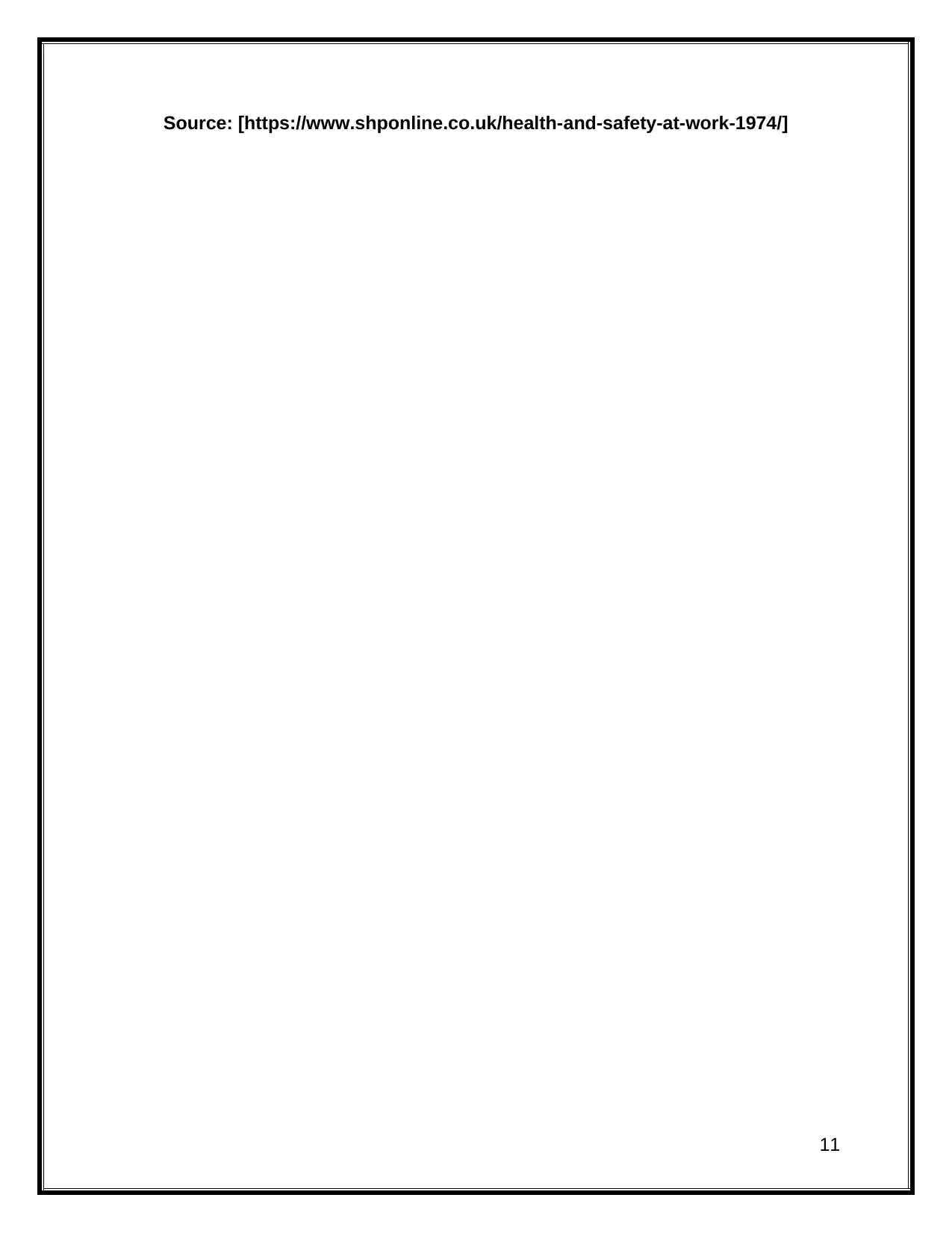
Source: [https://www.shponline.co.uk/health-and-safety-at-work-1974/]
11
11
⊘ This is a preview!⊘
Do you want full access?
Subscribe today to unlock all pages.

Trusted by 1+ million students worldwide
1 out of 26
Related Documents
Your All-in-One AI-Powered Toolkit for Academic Success.
+13062052269
info@desklib.com
Available 24*7 on WhatsApp / Email
![[object Object]](/_next/static/media/star-bottom.7253800d.svg)
Unlock your academic potential
Copyright © 2020–2026 A2Z Services. All Rights Reserved. Developed and managed by ZUCOL.

